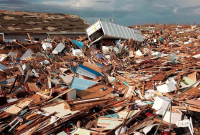Support strong Canadian climate journalism for 2025
This story was originally published by HuffPost and appears here as part of the Climate Desk collaboration
The Bahamas looks poised to greenlight drilling for oil in waters about 150 miles from South Florida just months after Hurricane Dorian ravaged the island nation and caused a major spill on Grand Bahama island.
The Bahamas Petroleum Company (BPC) hopes to drill its first exploratory well in an area 100 miles southwest of the nation’s Andros Island as early as next month, the company said in a recent regulatory filing. The Perseverance #1 venture would coincide with the 10-year anniversary of the Deepwater Horizon oil spill, which started in April 2010 and released more than 200 million gallons of crude oil into the Gulf of Mexico.
There is currently no offshore drilling in Bahamian waters.
“Perseverance #1 has the potential to open a world-class, new-frontier basin offshore Bahamas, less than 200 miles from the world’s largest hydrocarbon market/infrastructure,” Simon Potter, the chief executive officer of BPC, said in a statement accompanying the regulatory filing. He called the planned well “one of the premier prospects that could be drilled globally this year” with the potential to “transform the revenue-generating capacity of the Bahamian economy.”
The nation and its tourism-dependent economy took a major hit last September when Hurricane Dorian, a powerful Category 5 storm that scientists say was strengthened by planetary warming, slammed into the Abaco Islands and then stalled over Grand Bahama for 30 hours. The storm killed at least 67 people, left hundreds more unaccounted for and caused an estimated $3.4 billion in damage.

In a Sept. 27 speech at the United Nations in New York, Bahamian Prime Minister Hubert Minnis called on world leaders to “treat the global climate emergency as the greatest challenge facing humanity.” He said island nations like the Bahamas “are on the frontlines of being swallowed into an abyss created initially by human activity and increasingly by inaction.”
Last year’s hurricane disaster offered a fresh reminder of the threat that climate change poses to coastal fossil fuel infrastructure around the globe, much of which is not built to withstand storms of Dorian’s magnitude. On the island of Grand Bahama, Dorian’s winds ripped the dome roofs off storage tanks at an oil terminal owned by Norwegian energy giant Equinor, causing some 55,000 barrels ― 2.31 million gallons of oil ― to spill onto the ground. (The company initially estimated that 119,000 barrels spilled, but later updated the figure.)
Joseph Darville, an activist with local environmental groups Save the Bays and Waterkeepers Bahamas, said it is “deplorable” and “inconceivable” that the Bahamas would consider allowing offshore drilling after a hurricane-induced oil spill. The nation of some 400,000 people sits smack dab in the middle of the Atlantic’s Hurricane Alley.
“This is fiddling around with catastrophic events,” Darville said in a WhatsApp message. “It is an insult to the Bahamian people, in particular to environmental groups who have spoken out adamantly about this.”
The Bahamian government must still give final approval to BPC’s plan, but the company has told investors it is “confident of receiving appropriate approval in a timeframe consistent with the Company’s intended drilling campaign.” BPC estimates the area in which it wants to drill could hold up to 2 billion barrels of oil.
The company already has five licenses for offshore oil exploration covering approximately 4 million acres, according to its website. One of those licenses is for an area some 50 miles from Miami.

Oceana, a Washington, D.C.-based ocean conservation nonprofit, opposes the proposed Perseverance #1 drilling and warns that a spill there could devastate marine ecosystems and tourism not only in the Bahamas but also in Florida and along the U.S. East Coast.
“As recently as 2019, the Bahamian government made statements that they would not proceed with any offshore drilling, which we were really encouraged by,” said Diane Hoskins, a campaign director at Oceana. “To now see these announcements coming, it’s just alarming.”
The Deepwater Horizon rig was drilling an exploratory well when the explosion and spill occurred 10 years ago. Oil from that spill was found along 1,313 miles of coastline in Texas, Louisiana, Mississippi, Alabama and Florida, a 2016 study concluded.
“Our hope,” Hoskins said, “is that the prime minister will reconsider this and reverse course, recognizing the shared interests of the United States and the Bahamas.”
Offshore fossil fuel development is a major issue in Florida and along the East Coast. In 2018, the Trump administration proposed opening nearly all U.S. waters to oil and gas development, a move that drew outrage from Democrats and Republicans alike. Less than a week later, then-Interior Secretary Ryan Zinke announced that Florida’s coastal waters were “off the table” for offshore drilling, crediting the shift to the influence of then-Florida Gov. Rick Scott (R).
Sen. Marco Rubio (R-Fla.) said in a statement last week that he is “confident” the Trump administration will extend the ban on oil and gas drilling off Florida’s coast.





Comments